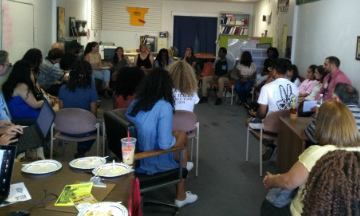
WORCESTER, Mass. – Organized by local public high school students, more than 40 people packed into the Pleasant Street Neighborhood Network Center here July 31 to participate in the “Schools We Deserve Dialogue,” in which participants discussed ways to improve the city’s schools.
Kicking off the meeting, which lasted for more than 90 minutes, Dr. Eric DeMeulenaere, of Clark University’s education department, requested that those in attendance, mostly Worcester students, think of their experience at school and what could be changed, and then to answer the question, “What would you like to see?”
The resulting discussion was wide ranging, and the students raised a variety of issues, including the school budget, greater diversity of educators, how students are treated by teachers and guidance counselors, and transportation.
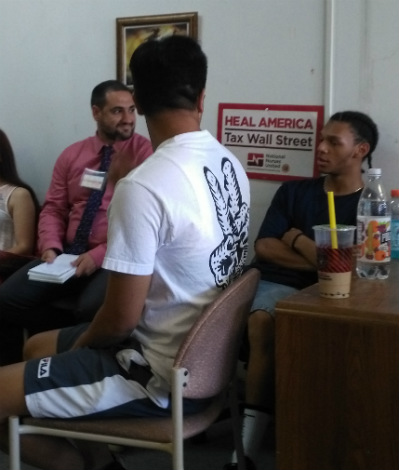
Kassie Quinlan, who helped to organize the event, said in the discussion that she would like to see schools adopt a better support system for students, and for guidance counselors to give students more attention. “I want to be seen as more than just a number,” she said.
Another student agreed, noting that funding was an issue. No matter how much a guidance counselor wants to help, she said, that counselor can’t give much attention to any particular student if he or she has a hundred people on his or her roster.
Several of the youth noted that they felt a high level of stress, and that the currently trendy emphasis on high-stakes testing added to that, as well as interfered with their desire to try their hand at learning something new. Betzabé Vásquez-Grande said that while seniors were able to pick their own classes, she felt compelled to take classes she knew she would do well in, so that she could achieve a high grade and become more competitive in the college admissions process. “I would rather have taken a class that would have taught me something new, but that I might not have done as well in,” she said.
Community member Martha Assefa agreed, pointing to State Sen. Harriette Chandler’s civics education bill, which would require students to learn civics in part through partaking in some kind of community-oriented project. School committee member John Monfredo, who was in attendance, said that he hoped schools could achieve a better balance of education and fun.
Dante Comparetto, a school committee candidate, said that high stakes testing crowded out other educational opportunities.
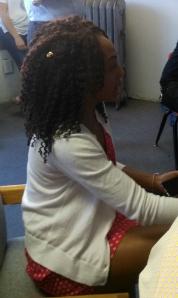
Morgan Johnson, a student at South High Community School, said that she was frustrated by the lack of communication from guidance counselors and other school leaders about things Worcester students needed to know. When DeMeulenaere asked how she found out answers to vital questions, she responded, “Google.”
Italo Fini, who recently graduated from Worcester Technical High School, emphasizing the need for schools to teach practical skills, asked “Who here learned how to ride the [public] bus in school?” According to Fini, many students he had known during middle school didn’t know how to ride the public bus, and consequently could not travel around.
Transportation itself took up a large part of the discussion, with many of the Worcester students voicing their frustration that school buses left only at the end of classes, meaning that extra-curricular activities were, in many cases, made impossible.
“I joined the track team but stopped after three days,” said student Jayli Charest. “My mother had to work, so she couldn’t pick me up, and she didn’t want me to walk the streets after dark.” If there was some form of public transport, Charest noted, she would have been able to continue the extracurricular activity.
A number of the young people felt that they were treated like criminals – or at least potential criminals – and took issue with several schools’ ban on hoodies (sweatshirts with hoods) and bookbags. While they found the ban offensive, they also noted the difficulty of carrying schoolbooks without a bag and, especially for schools that have not been rebuilt, not being able to wear a simple sweatshirt in the winter when they felt cold.
The results of the discussion will be presented to Worcester Public Schools superintendent Maureen Binienda, who has officially agreed to receive and consider them. However, Binienda will not be the first public official to hear the suggestions. While the vast majority of attendees were students, the audience included several elected officials.
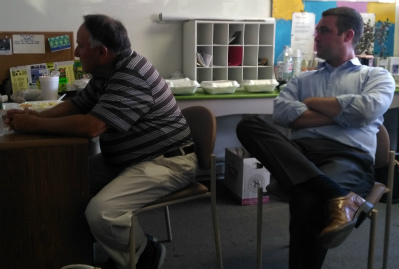
School committee member Brian O’Connell was at the event, as was Monfredo and Comparetto. Also in attendance were city council members Sarai Rivera and Gary Rosen, as well as State Representatives Dan Donahue and Mary Keefe.
In concluding the discussion, participants were asked to state would they would most like to see going forward. While there were many suggestions, better communication between the students and the schools and school committee was an overriding them. During that discussion, Council Member Rivera noted that district councilors and some at-large council members routinely visit community meetings. She suggested that, in a similar way, school committee members should consider visiting student council and other youth-led meetings.
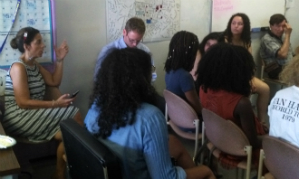
After the event wrapped up, the student organizers made plans to write up their notes for Binienda, and then celebrated the event’s success with ice cream at the shop next door.
Check out related coverage from the Worcester Magazine and the Telegram and Gazette.
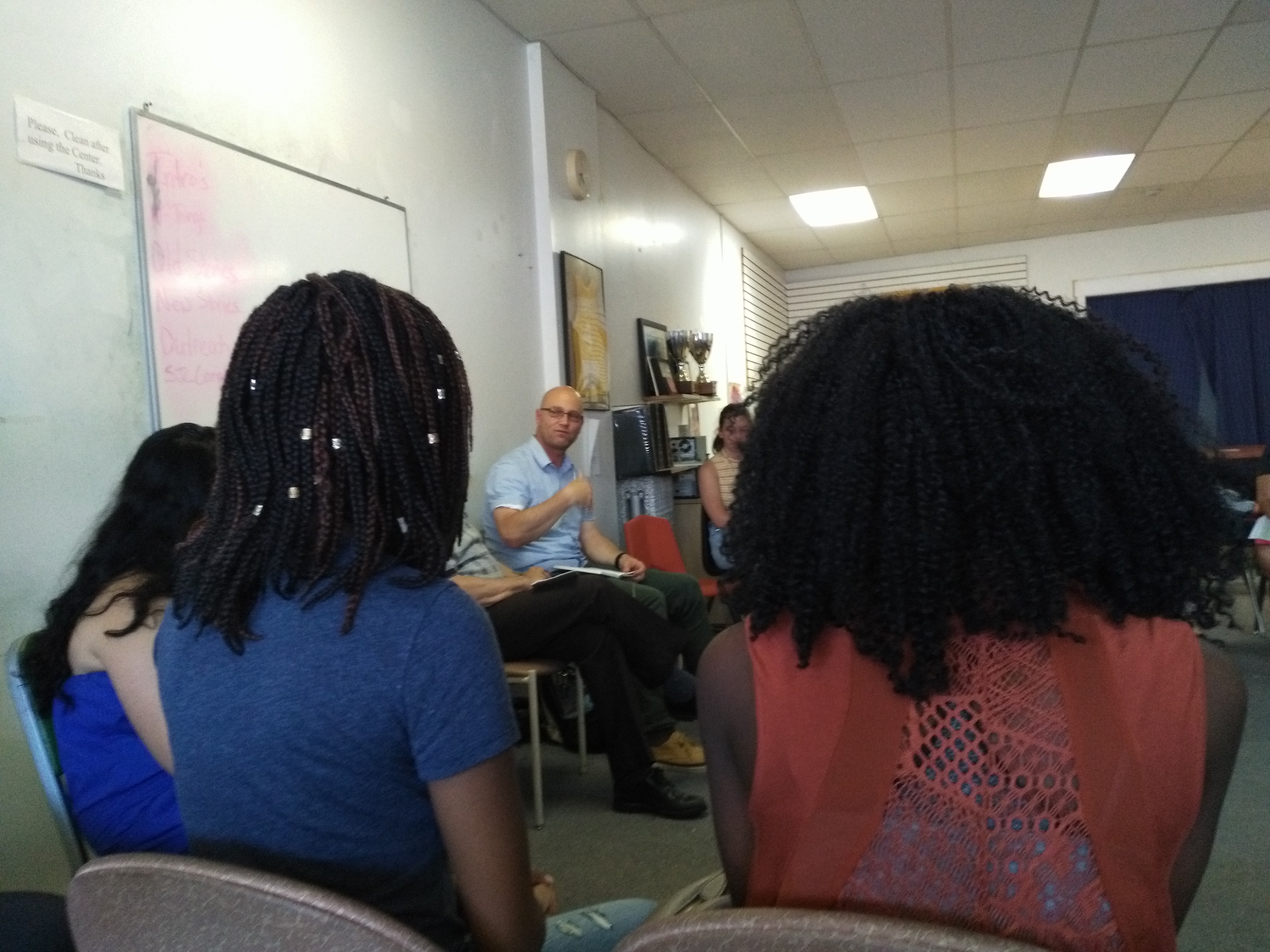


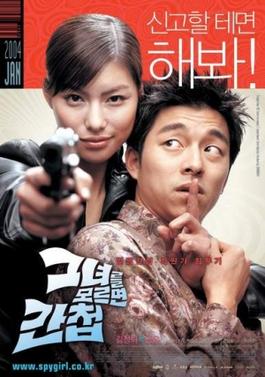
worc east middle has a full-time worc police officer there along with all the high schools.When there are gangs with 13 to 14 year olds in it there is a problem that is pointless to deal with.I would never raise kidz in worc.A 14 yearold was recently shot in worc.What motive could someone have to do that?